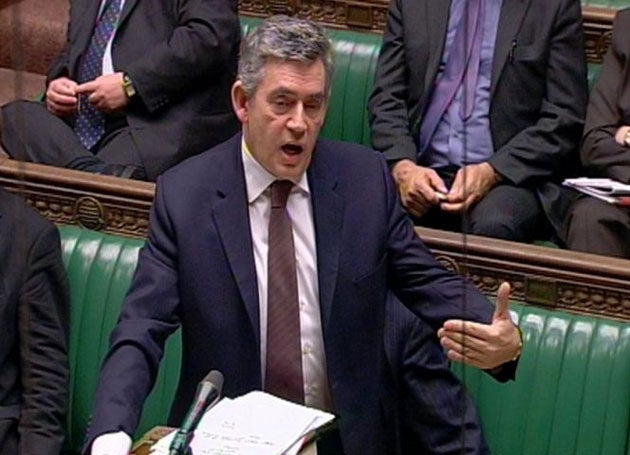Cameron predicts £1,500 'tax bombshell'

Your support helps us to tell the story
From reproductive rights to climate change to Big Tech, The Independent is on the ground when the story is developing. Whether it's investigating the financials of Elon Musk's pro-Trump PAC or producing our latest documentary, 'The A Word', which shines a light on the American women fighting for reproductive rights, we know how important it is to parse out the facts from the messaging.
At such a critical moment in US history, we need reporters on the ground. Your donation allows us to keep sending journalists to speak to both sides of the story.
The Independent is trusted by Americans across the entire political spectrum. And unlike many other quality news outlets, we choose not to lock Americans out of our reporting and analysis with paywalls. We believe quality journalism should be available to everyone, paid for by those who can afford it.
Your support makes all the difference.Gordon Brown raised the spectre of deflation yesterday as David Cameron predicted that soaring government borrowing would result in a £1,500 "tax bombshell" for average earners. In fiery Commons exchanges with the Conservative leader, Mr Brown acknowledged for the first time that the world could face the first period of falling prices since the Great Depression of the 1930s. That would risk a recessionary spiral in which people did not spend because they thought prices would fall further, and interest rates could not be cut to stimulate demand once they fell to zero.
The Prime Minister talked up the prospects of big tax cuts in next Monday's pre-Budget report to stave off the threat of falling prices. But there are signs of tension over the scale of the reductions, which are being finalised by the Chancellor, Alistair Darling.
Treasury officials are alarmed by media speculation that the giveaway could be as high as £30bn. They are worried that Mr Brown is raising huge expectations that Mr Darling may struggle to deliver – risking either a borrowing hike that would be difficult to justify or a "damp squib" statement next week if the figure is much lower.
On another day of bleak economic news, Citigroup, the world's biggest bank, announced it would cut 52,000 jobs on top of 23,000 already announced. "Certainly [the cuts] will fall particularly heavily on London and New York," Citigroup chairman Win Bischoff told a business forum in Dubai.
The Prime Minister accused Mr Cameron and his shadow Chancellor, George Osborne, of not understanding changes in the global economy. "Last year and in the last few months the problem has been inflation combined with the credit crunch," Mr Brown said. "In the next year the problem is deflation and inflation close to zero."
The answer, he added, was "fiscal action" – lower taxes and higher state spending – to help families and businesses so as not to undo the benefits of interest rate cuts. He said after the weekend meeting of leaders of the world's 20 biggest economies in Washington, the Tories were "the only party" standing outside the developing consensus across the world.
Downing Street later sought to play down Mr Brown's remarks about falling prices. "This is obviously a risk," his spokesman said, but stressed that neither the Government nor the Bank of England made deflation their "central forecast". He added: "We have seen sharp falls in commodity and food prices, which is obviously of benefit to families, but if demand in the economy is too low that carries risks as well."
Mr Cameron warned that next week's "borrowing bombshell" would become a "tax bombshell". "Tax cuts should be for life, not just for Christmas," he said. Kenneth Clarke, the former Tory chancellor, said the borrowing plans would store up "impossible problems" for the next government and were being initiated "as much for electoral as for economic reasons".
Labour hit back by accusing the Tories of talking down the British economy. Lord Mandelson, the Business Secretary, accused Mr Osborne of "reckless and irresponsible" behaviour. He said: "What George Osborne was trying to do in his remarks was to undermine the confidence of markets, undermine the confidence of traders that the medium-term direction of government policy is sound."
Join our commenting forum
Join thought-provoking conversations, follow other Independent readers and see their replies
Comments